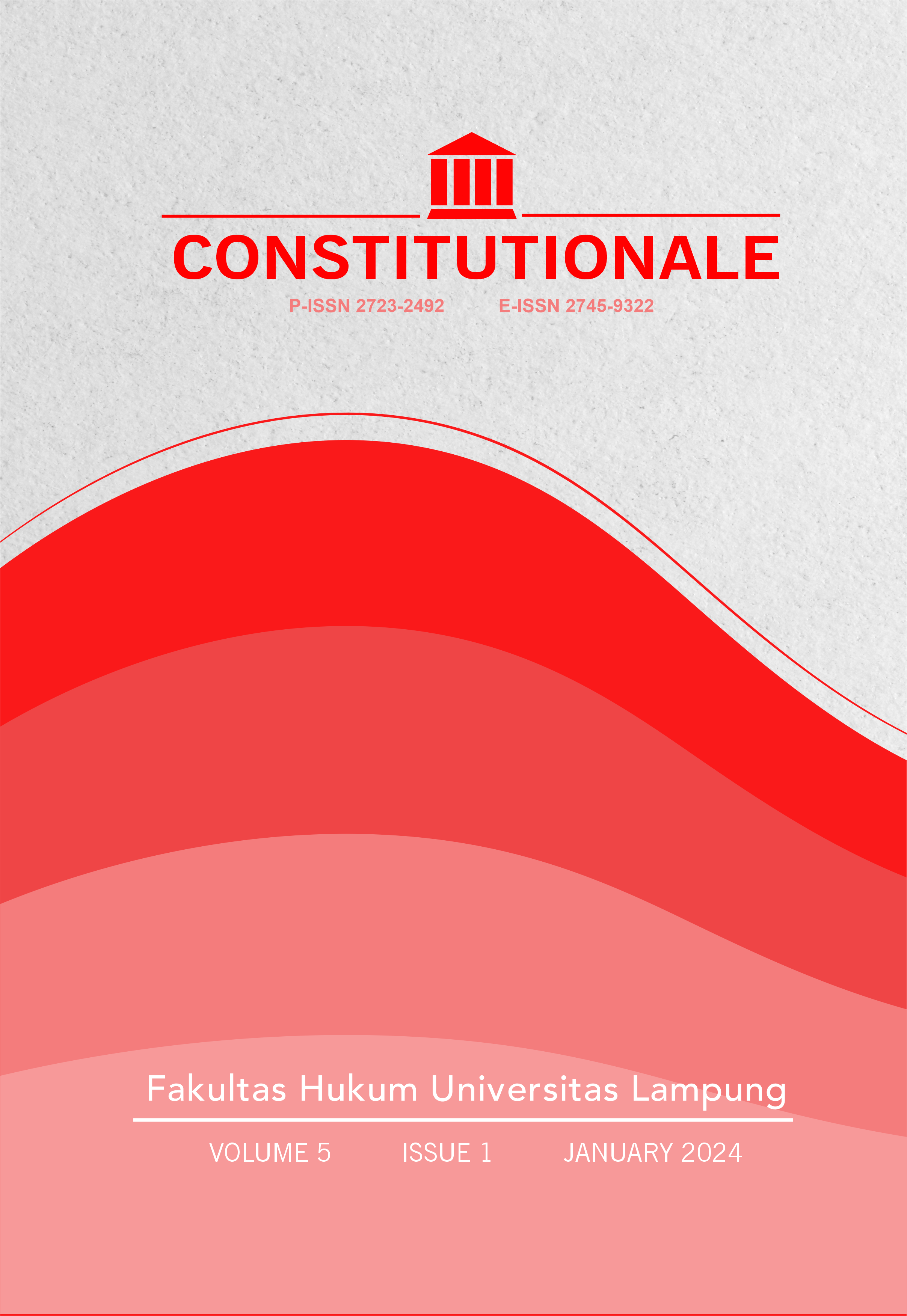Segregation by Design: An Analysis of Apartheid-Enabling Constitutional Provisions
DOI:
https://doi.org/10.25041/constitutionale.v5i1.3246Abstract
This paper critically examines constitutional provisions that facilitate apartheid systems, focusing on how these provisions enable the establishment and perpetuation of segregation and discrimination. Despite global condemnation of apartheid, similar traits persist in various jurisdictions today, notably in Israel's treatment of Palestinians and Myanmar's oppression of the Rohingya. This research investigates the constitutions of South Africa, Israel, and Myanmar to analyze how they legitimize and sustain segregationist regimes. Using a substantive and structural comparative analytical approach, the research identifies common factors that enable apartheid practices, including identity-based citizenship conditions, discriminatory treatment provisions, restrictions on the political participation of marginalized groups, and entrenched power structures. The findings reveal that apartheid-enabling provisions do not always explicitly endorse segregation but often grant broad legislative powers that can be exploited, as seen in Apartheid South Africa. Similarly, the constitutions of Israel and Myanmar provide constitutional protection to select ethnic groups, thereby institutionalizing segregation. The research concludes that four key elements common to the studied constitutions contribute to the maintenance of apartheid systems: differentiated citizenship status, legitimized segregationist practices, limited political participation for certain groups, and entrenched power structures resistant to reform.
Keywords:
Apartheid, Constitution, Israel, Myanmar, South AfricaReferences
ACRI, and Adalah. “ACRI and Adalah Petition against the ‘Nakba Law’: Overview and Excerpts from the High Court Petition,” 2011.
Beetham, David. The Legitimation of Power. 2nd ed. Palgrave Macmillan, 2013.
———. The Constitution of Myanmar: A Contextual Analysis (Constitutional Systems of the World). Reprint. Hart Publishing, 2020.
Davenport, T., and C. Saunders. South Africa: A Modern History. Palgrave Macmillan UK, 2000.
Fournier, Théo. “The Constitutional Legitimation of Authoritarian Regimes – A Comparative Analysis of Apartheid South Africa and Communist Hungary.” EUI Department of Law Research Paper No. 2020/03, 2020.
Khalidi, Rashid. The Hundred Years’ War on Palestine: A History of Settler Colonialism and Resistance, 1917–2017. Metropolitan Books, 2020.
Oren, Michael. Six Days of War: June 1967 and the Making of the Modern Middle East. Oxford University Press, 2002.
Rawls, John. Lectures on the History of Political Philosophy. Edited by Samuel Freeman. Belknap Press of Harvard University Press, 2007.
Said, Edward. The Question of Palestine. Vintage, 1992.
Skorek, Artur. “Basic Laws of Israel BT - The Palgrave International Handbook of Israel.” edited by P R Kumaraswamy, 1–14. Singapore: Springer Singapore, 2021.
Breckenridge, Keith. “The Book of Life: The South African Population Register and the Invention of Racial Descent, 1950–1980.” Kronos, no. 40 (November 23, 2014): 225–40.
Cheesman, Nick. “How in Myanmar ‘National Races’ Came to Surpass Citizenship and Exclude Rohingya.” Journal of Contemporary Asia 47, no. 3 (May 27, 2017): 461–83.
Crouch, Melissa. “Dictators, Democrats, and Constitutional Dialogue: Myanmar’s Constitutional Tribunal.” International Journal of Constitutional Law 16, no. 2 (June 15, 2018): 421–46.
———. “States of Legal Denial: How the State in Myanmar Uses Law to Exclude the Rohingya.” Journal of Contemporary Asia 51, no. 1 (January 1, 2021): 87–110.
Greenstein, Ran. “Israel, Palestine, and Apartheid.” Insight Turkey 22, no. 1 (November 22, 2020): 73–92.
Easton, David. “A Re-Assessment of the Concept of Political Support.” British Journal of Political Science 5, no. 4 (1975): 435–457.
Hopkins, Kevin. “Assessing the World’s Response to Apartheid: A Historical Account of International Law and Its Part in the South African Transformation.” University of Miami International & Comparative Law Review 10, no. 1 (n.d.): 241–55.
Jabareen, Hassan, and Suhad Bishara. “The Jewish Nation-State Law.” Journal of Palestine Studies 48, no. 2 (190) (November 23, 2019): 43–57.
Jackson, Miles. “The Definition of Apartheid in Customary International Law and the International Convention on the Elimination of All Forms of Racial Discrimination.” International and Comparative Law Quarterly 71, no. 4 (2022): 831–55.
Kapshuk, Yoav, and Lisa Strömbom. “Israeli Pre-Transitional Justice and the Nakba Law.” Israel Law Review 54, no. 3 (2021): 305–23.
Khoury, Elias. “Rethinking the Nakba.” Critical Inquiry 38, no. 2 (November 23, 2012): 250–66.
Landis, Elizabeth S. “South African Apartheid Legislation I: Fundamental Structure.” The Yale Law Journal 71, no. 1 (November 23, 1961): 1–52.
Lee, Ronan. “Myanmar’s Citizenship Law as State Crime: A Case for the International Criminal Court.” State Crime Journal 8, no. 2 (November 22, 2019): 241–79.
Lingaas, Carola. “The Crime against Humanity of Apartheid in a Post-Apartheid World.” Oslo Law Review 2, no. 2 (March 7, 2017): 86–115.
Loveland, Ian. By Due Process of Law: Racial Discrimination and the Right to Vote in South Africa 1855-1960. Hart Publishing, 1999.
Malhotra, Ram C. “Apartheid and the United Nations.” The ANNALS of the American Academy of Political and Social Science 354, no. 1 (1964): 135–44.
Momberg, Marthie. “Apartheid Then and Now - Where Are We Heading? The Case of Israel.” Stellenbosch Theological Journal 9 (2023): 1–19.
Rhoads, Elizabeth L. “Citizenship Denied, Deferred and Assumed: A Legal History of Racialized Citizenship in Myanmar.” Citizenship Studies 27, no. 1 (January 2, 2023): 38–58.
The Editors of Encyclopaedia Britannica. “Apartheid.” Encyclopedia Britannica, 2023. https://www.britannica.com/topic/apartheid.
———. “Languages of South Africa.” Encyclopedia Britannica, 2023. https://www.britannica.com/place/South-Africa/Languages.
———. “South Africa Act.” Encyclopedia Britannica, 2020. https://www.britannica.com/event/South-Africa-Act.
Downloads
Downloads
Published
How to Cite
Issue
Section
Copyright
Copyright (c) 2024 by the Auhtor(s) Published by Development Centre Research of Law and Scientific Publication on behalf of the Faculty of Law, Universitas Lampung
License

This work is licensed under a Creative Commons Attribution-ShareAlike 4.0 International License.









